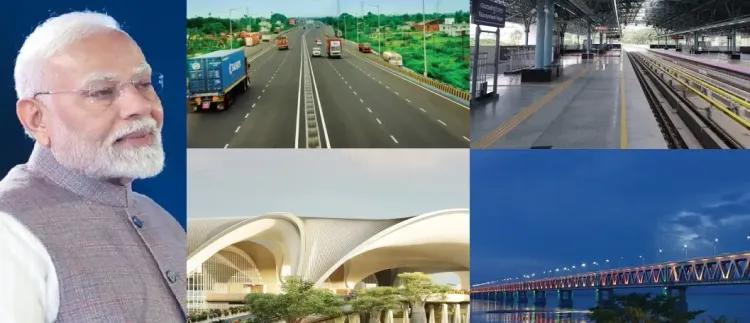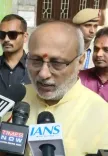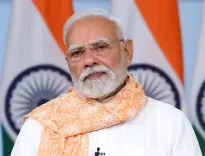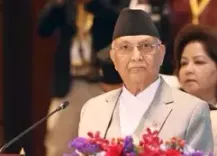Global Perspective of India Transformed Under PM Modi's Leadership: Insights from Oxford Professor (IANS Interview)

New Delhi, Dec 4 (NationPress) Commending Prime Minister Narendra Modi for his effective administration, Oxford University professor Soumitra Dutta remarked on Wednesday that the global perception of India has transformed over the last 10 years as the country strides confidently toward becoming a significant economic powerhouse.
In an exclusive conversation with IANS, Professor Dutta, who recently co-authored a research paper titled, 'From Gridlock to Growth - How Leadership Enables India’s PRAGATI Ecosystem to Power Progress', discussed various topics including the completion of long-overdue infrastructure initiatives and the digital governance revolution.
Excerpts:
IANS: What inspired the study on India's digital governance revolution and its results?
Soumitra Dutta: The primary objective has always been to comprehend how India's advancement in digital platforms and governance has influenced national development. In this regard, the Pro-Active Governance and Timely Implementation (PRAGATI) framework has played a crucial role in enhancing the efficiency of infrastructure projects in India and effectively resolving significant delays in projects, such as the construction of a bridge over the Brahmaputra River in Assam. The foundation of PRAGATI originated from the State-Wide Attention on Grievances by Application of Technology, or SWAGAT, system that Prime Minister Modi established in Gujarat during his tenure as Chief Minister in 2002. Following a devastating earthquake, he utilized this system, which combines available digital tools and his direct involvement as Chief Minister, to oversee recovery efforts and expedite the state's recovery from that unfortunate disaster. The Prime Minister's hands-on engagement has remained a vital aspect of the platform's success.
IANS: Can you elaborate on how PM Modi's personal accountability and continuous supervision have ensured the timely completion of numerous projects?
Soumitra Dutta: Major infrastructure initiatives often face challenges related to time and budget overruns. However, the PRAGATI framework has effectively unblocked several projects that had been stalled for an extended period. Numerous initiatives launched in the past faced delays due to bureaucratic obstacles or insufficient political commitment. Prime Minister Modi took the lead and ensured their completion. A prime example is the Bogibeel bridge in Assam, which spans the Brahmaputra River, long regarded as an unbridgeable waterway. The project, initially approved in 2002, saw minimal progress until 2012, resulting in a developmental standstill in the region. In 2015, after PM Modi reviewed the project through PRAGATI, progress finally resumed, leading to its completion by 2018. Thus, the project ecosystem is aiding national development by facilitating the completion of numerous large-scale initiatives.
IANS: The study mentions projects amounting to Rs 17.05 lakh crore ($205 billion) undergoing the PRAGATI review process, resulting in the completion of many long-stalled, large-scale initiatives. Can you elaborate?
Soumitra Dutta: Research indicates that for every rupee effectively invested in infrastructure, the GDP improves by approximately two and a half to three times. This significant enhancement translates into national development. As we consider India's goals for 2047, which aim for the nation to achieve full development, it is essential to significantly escalate infrastructure initiatives—not only in roads, highways, and power stations, but also in social projects. Therefore, substantial systemic change is crucial for India to realize its ambitions by 2047.
IANS: What influence does it have on governance when top leadership is committed to utilizing and implementing technology?
Soumitra Dutta: Gathering and disseminating data regarding large-scale projects is not inherently new. However, executing this at the scale of India's complexity is extraordinarily impressive. Other nations often lack the sustained commitment from top leaders to scrutinize project execution details. Yet, within the PRAGATI framework, Prime Minister Modi has consistently focused on major, challenging projects and sought to unblock them. This is exceptional, and his consistent dedication over many years has fostered a culture where stakeholders recognize the importance of collaboration to advance the country. Prime Minister Modi serves as an exemplary role model.
IANS: How do you perceive India's ongoing journey toward becoming a developed nation by 2047?
Soumitra Dutta: Numerous factors are aligning favorably for India in its remarkable quest to become a Viksit Bharat, aspiring to be a developed nation by 2047—the centenary of the country's independence. India is at a historically advantageous point in its development trajectory. Various geopolitical, technological, and leadership dynamics, epitomized by Prime Minister Modi's direction, are supportive of domestic progress. Thus, I believe India is well-positioned on this developmental path.
IANS: You travel globally and engage with leading professionals and young students at the university. How do they perceive India's rise over the last decade?
Soumitra Dutta: The perception and brand image of India have significantly improved under PM Modi's leadership. India is now recognized as a land of investment, opportunity, and a key player on the global stage. This is vital as India is seen as a legitimate contributor to global growth. The nation has aided in the development of other countries, including those in the global South. The PRAGATI framework presents valuable lessons for leaders in the Global South—especially in large parts of Africa, Latin America, and Asia—who also require significant investments in infrastructure and comprehensive systemic changes. They need to learn how to execute projects more effectively, swiftly, and efficiently. The PRAGATI ecosystem illustrates a pathway for achieving this successfully.







